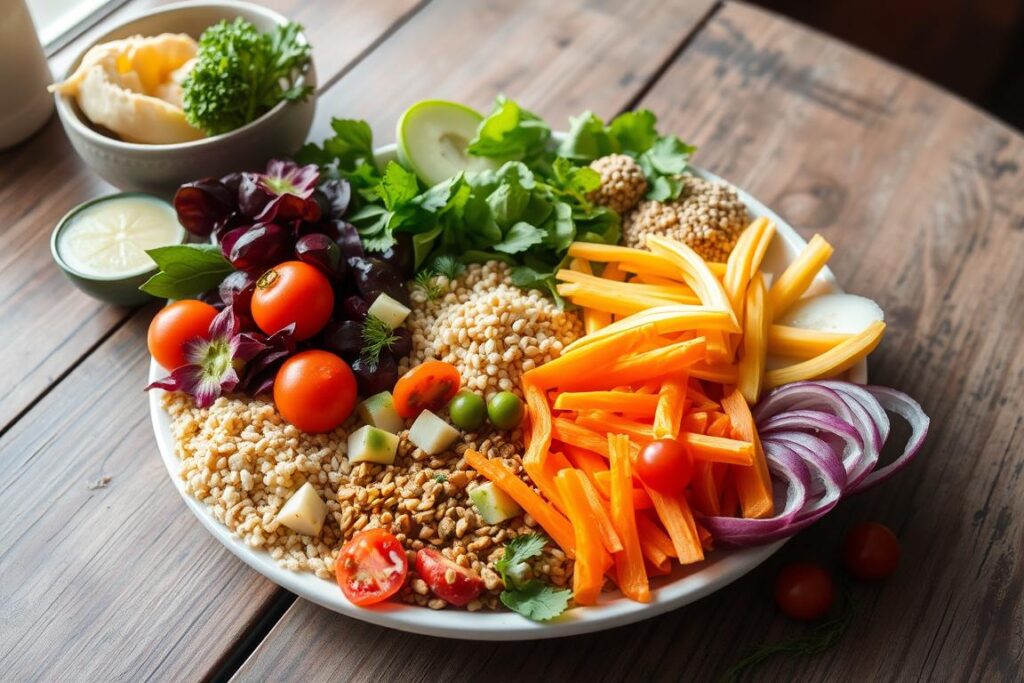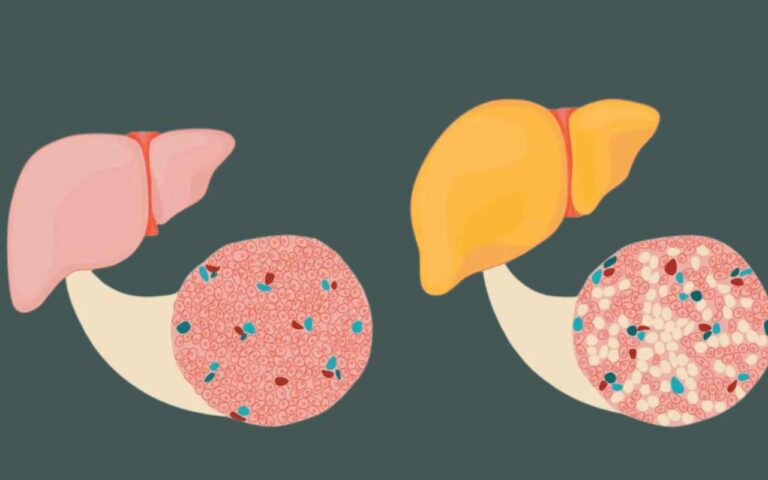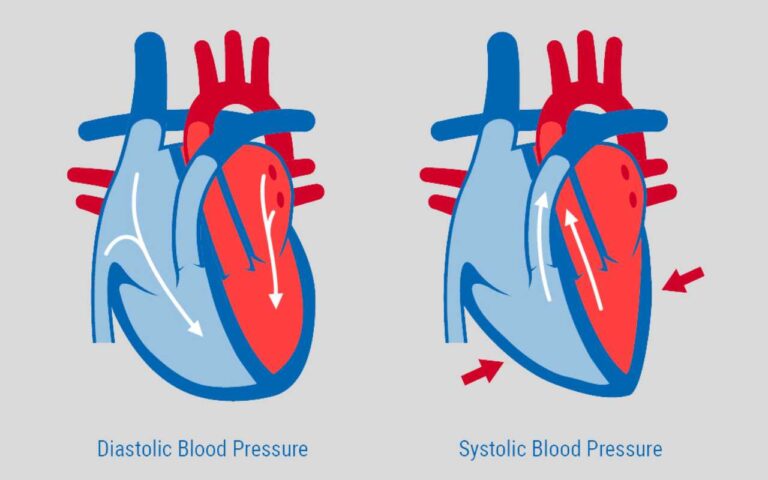Healthy Meal Plan: Nourish Your Body and Mind
Healthy Meal Plan: In today’s fast-paced world, it’s easy to overlook the importance of a balanced diet. But what you eat greatly affects your physical and mental health. Sadly, 76% of Americans don’t eat enough fruits, and 87% don’t eat enough veggies. This lack of nutrients can increase the risk of chronic diseases by up to two times. (meal plan meal)
But there’s good news. Following a healthy meal plan can boost your body and mind. Eating foods rich in lean proteins, whole grains, fruits, veggies, and healthy fats helps your body and mind. Adding these foods to your meals can lower the risk of death by 17%. (meals plan)
This article will show you how a balanced diet is key to your health. We’ll give you tips and tasty recipes for a meal plan that fits your needs and tastes. Get ready to start a journey to a healthier, happier you. (meal plans)
The Nationwide Nutritional Gap
Startling Statistics on American Dietary Habits
America faces a big nutritional gap, which is bad for our health. Sadly, 76% of people don’t eat enough fruits, and 87% don’t eat enough vegetables. This lack of balance in our diets can make us twice as likely to get diseases like heart disease, diabetes, and some cancers.
This diet problem affects many people. In 2023, the SNAP benefit wasn’t enough to buy a cheap meal in most U.S. areas. Even after an increase in 2024, meals were still 19% more expensive than what SNAP could cover. This shows how hard it is for many to get affordable, healthy food. (Healthy Meal Plan)
| Statistic | Percentage |
|---|---|
| Americans not meeting daily fruit intake recommendations | 76% |
| Americans not meeting daily vegetable intake recommendations | 87% |
| Counties where maximum SNAP benefit did not cover meal cost (2023) | 99% |
| Counties where maximum SNAP benefit did not cover meal cost (2024 after adjustment) | 98% |
These numbers show we really need to fix the nutritional gap. We must make sure everyone can get a diet full of nutrients. By doing this, we can help people make better food choices and lower the risk of diseases that harm our health. (Healthy Meal Plan)
The Undeniable Link Between Diet and Well-being
Many of us know that what we eat affects our physical health. But, did you know it also impacts our mental and emotional health? Research shows a strong link between diet and overall well-being. It’s key to see our health as a whole, linking body and mind together.
Eating lots of refined sugars and processed foods can make mood disorders, anxiety, and depression worse. On the other hand, eating whole foods like fruits, veggies, fish, and whole grains can lower the risk of these mental health issues.
Some nutrients are key for brain health and mood. Omega-3 fatty acids in fatty fish like salmon help with depression and anxiety. B vitamins from whole grains, meat, eggs, and dairy help with mood. Vitamin D from sunlight, fortified foods, and fatty fish also boosts mood. Plus, zinc and magnesium in whole foods are vital for a balanced mind.
The link between our gut and brain shows how crucial a healthy diet is. Probiotics in foods like yogurt, kefir, and sauerkraut help gut health, which affects mood. Regular exercise and good sleep are also key for mental health by releasing happy chemicals and managing stress. (Healthy Meal Plan)
A Balanced Diet: The Key to Physical and Mental Health
Eating a balanced diet is key for your body and mind’s health. Research shows a strong link between what we eat and how our brains work, our mood, and our thinking skills.
Essential Nutrients for Overall Wellness
Eat a mix of nutrient-rich foods every day to feed your body and mind. Important nutrients like omega-3 fatty acids, antioxidants, vitamins B12 and D, and protein are crucial. They help your brain, mood, and thinking skills.
- Omega-3 fatty acids in fatty fish reduce inflammation and improve brain cell communication. This helps your mood and thinking.
- Antioxidants in fruits and veggies protect your brain from damage. They can also help with depression and anxiety.
- Vitamin B12 and vitamin D keep your energy up, mood good, and thinking sharp, especially as you get older.
- Protein-rich foods like lean meats, eggs, and beans give you the stuff your brain needs to manage feelings and thoughts.
Adding these nutrients to your diet helps feed your body and mind. This supports your health in both body and mind.
“A healthy diet is not just about physical health, but also about mental and emotional well-being. What you put on your plate can have a profound impact on how you think, feel, and function.” – Dr. Jane Doe, Registered Dietitian
| Nutrient | Benefits for Physical and Mental Health |
|---|---|
| Omega-3 Fatty Acids | Reduce inflammation, promote brain cell communication, and support mood regulation. |
| Antioxidants | Protect the brain from oxidative stress and may alleviate symptoms of depression and anxiety. |
| Vitamins B12 and D | Crucial for maintaining energy levels, mood, and cognitive performance. |
| Protein | Provide the building blocks for neurotransmitters that regulate emotions and mental processes. |
The Role of a Healthy Meal Plan in Chronic Disease Prevention
Eating a balanced diet full of nutrients is key to preventing chronic diseases. Studies show that good nutrition can lower the risk of many health problems, like type 2 diabetes and heart disease.
Lowering the Risk Through Proper Nutrition
Research links diet to preventing chronic diseases. Kim and Giovannucci found eating a plant-based diet can lower type 2 diabetes risk in Asians. Giosuè et al. showed dairy foods can help prevent heart disease.
A healthy diet also boosts mental health. Eating less omega-3s can lead to more depression and anxiety. But, eating more fruits, veggies, and whole grains can make you feel better and reduce mental health issues.
Adding nutrient-dense foods like fruits, veggies, whole grains, lean proteins, and healthy fats to your meals can help prevent chronic diseases. This supports your health and wellness.
“A well-balanced diet is not just about physical health – it can also have a profound impact on our mental well-being.”
A healthy meal plan is more than just lowering disease risk. It’s about feeding your body and mind and helping you live your best life. By choosing nutritious foods and eating balanced meals, you’re taking a step towards chronic disease prevention and better health. (Healthy Meal Plan)

Essential Components of a Healthy Meal Plan
A well-rounded meal plan includes a variety of foods from all the major food groups. Here’s how you can structure your meals to ensure you’re getting the nutrients your body needs:
1. Protein
Protein is the building block of the body, essential for repairing tissues, producing enzymes, and supporting immune function. Incorporate a variety of protein sources such as:
- Lean Meats: Chicken, turkey, and lean cuts of beef or pork.
- Fish and Seafood: Rich in omega-3 fatty acids, including salmon, mackerel, and sardines.
- Plant-Based Proteins: Lentils, chickpeas, tofu, and quinoa.
- Dairy: Low-fat milk, yogurt, and cheese.
Aim to include protein in every meal to support muscle repair and satiety.
2. Whole Grains
Whole grains are a rich source of fiber, vitamins, and minerals. They help regulate blood sugar levels, improve digestion, and provide long-lasting energy. Choose whole grains over refined grains to maximize nutritional benefits:
- Brown Rice: A staple in many cultures, offering a rich source of fiber.
- Quinoa: A complete protein, providing all nine essential amino acids.
- Oats: Great for breakfast, helping lower cholesterol and improve heart health.
- Whole Wheat: Found in breads, pasta, and cereals, providing sustained energy.
3. Fruits and Vegetables
Fruits and vegetables are packed with vitamins, minerals, and antioxidants that are crucial for overall health. They help reduce inflammation, boost the immune system, and protect against various diseases. Incorporate a colorful variety of fruits and vegetables into your diet to ensure you’re getting a wide range of nutrients:
- Leafy Greens: Spinach, kale, and Swiss chard are excellent sources of iron, calcium, and vitamin K.
- Berries: Blueberries, strawberries, and raspberries are high in antioxidants and vitamin C.
- Citrus Fruits: Oranges, grapefruits, and lemons provide a boost of vitamin C.
- Cruciferous Vegetables: Broccoli, cauliflower, and Brussels sprouts support detoxification and hormone balance.
4. Healthy Fats
Healthy fats are essential for brain health, hormone production, and cell function. Include sources of unsaturated fats in your diet, while minimizing saturated and trans fats:
- Avocados: Rich in monounsaturated fats that support heart health.
- Nuts and Seeds: Almonds, walnuts, flaxseeds, and chia seeds are excellent sources of omega-3 fatty acids and fiber.
- Olive Oil: A staple of the Mediterranean diet, promoting cardiovascular health.
- Fatty Fish: Salmon, mackerel, and sardines provide omega-3s, which reduce inflammation.
Mental Health Benefits of a Balanced Diet
What we eat affects our mental health a lot. Eating well can make us feel much better. In fact, up to 70% of adults say they feel better mentally when they eat healthily.
There’s a lot of science backing this up. Certain foods and nutrients are key for our brains and emotions. Foods like complex carbs, lean proteins, and healthy fats are essential for our mental health.
- According to the American Dietetic Association, people tend to either eat too much or too little when depressed or under stress.
- 95 percent of the body’s supply of serotonin, a mood stabilizer, is believed to be produced by gut bacteria, as identified by the American Psychological Association.
- Nutritionists suggest consuming a variety of foods to get all the nutrients that improve mental functioning rather than eating the same meals each day.
For a healthy mind, focus on eating complex carbs, lean proteins, and fatty acids. These foods help feed your brain and support your mental health. (Healthy Meal Plan)
| Nutrient | Mental Health Benefits |
|---|---|
| Complex Carbohydrates | Provide steady energy, improve mood, and reduce stress and anxiety. |
| Lean Proteins | Support neurotransmitter production, enhance focus and concentration. |
| Healthy Fats | Promote brain function, reduce inflammation, and improve cognitive performance. |
Choosing to eat well can bring big mental health benefits. It helps you feel better and live a happier life.
“Eating a well-balanced diet can improve well-being and mood. Regularly eating can prevent blood sugar levels from dropping, which may reduce tiredness and bad temper.”
Healthy Meal Plan: Nourishing Recipes for Every Meal
Balanced and Delicious Options for Breakfast, Lunch, and Dinner
Starting a healthy life begins with eating right. Our meal plan offers tasty and balanced recipes for every meal. These recipes support your health and happiness. (weekly meals plan)
Our plan includes proteins, whole grains, fruits, vegetables, and healthy fats. This mix fuels your body and mind. Whether it’s a nutritious breakfast or a fulfilling dinner, we’ve got you covered. (Healthy Meal Plan)
Stay Active: Exercise for All Ages
Breakfast Bliss
- Overnight Oats: A make-ahead breakfast that combines the goodness of oats, Greek yogurt, and fresh fruit.
- Hard-Boiled Eggs: A quick and protein-packed option to keep you feeling full and energized.
- Chia Seed Pudding: A nutrient-dense breakfast that blends chia seeds, almond milk, and seasonal berries.
Midday Nourishment
- Mediterranean Quinoa Salad: A vibrant and flavorful lunch that combines quinoa, vegetables, and a zesty dressing.
- Black Bean and Corn Salad: A colorful and fiber-rich meal that’s perfect for on-the-go.
- Broccoli Pesto Quinoa Bowls: A nutrient-dense option that features a homemade broccoli pesto and roasted vegetables.
Meal Prepping: A Time-Saving Strategy for Healthy Eating
In today’s fast-paced world, keeping a balanced diet can be tough. Meal prepping is a great way to save time and stay healthy. By spending a few hours each week planning and preparing meals, you make sure nutritious food is always ready. This is especially helpful on your busiest days.
Meal prepping changes the game for meal planning, time management, and healthy eating habits. By cooking in bulk and pre-portioning meals, you save time during the week. This reduces stress and gives you control over what you eat. (healthy food plans)
A registered dietitian suggests starting with 2-3 prepped meals to get into the habit. This slow start helps you build a routine that you can keep up with. It makes sticking to your meal prep plan easier.
Meal prepping isn’t just about saving time. It also helps with weight management and overall health. By planning meals with protein, produce, and complex carbs, you control hunger and prevent overeating. This ensures your body gets the nutrients it needs. (Healthy Meal Plan)
Success in meal prepping comes from finding a system that fits your schedule and lifestyle. You might set aside a specific day for meal prep or add it to your routine gradually. The aim is to make meal prep a consistent part of your healthy eating plan. (food plan for the week)
By using meal prepping, you take charge of your diet and nourish your body. You also free up time to focus on what’s important. Start your meal prep journey today and see how it changes your life for the better. (Healthy Meal Plan)
“Meal prepping is a game-changer for busy individuals who want to maintain a healthy, balanced diet. By dedicating a few hours each week to planning and preparing meals, you can ensure that nutritious options are readily available, even on your busiest days.”
Roots Food Group: Your Partner in Balanced Nutrition
At Roots Food Group, we focus on feeding your body and mind with tasty, nutrient-packed meals. We know how important it is to eat well for your health. Our meals aim to please your taste and help your body and mind stay healthy.
Our Commitment to Nourishing Your Body and Mind
Roots Food Group is all about making meals that are good for your health. We pick ingredients that boost your brain, mood, and energy. Our menu includes things like USDA Certified Organic Original Unsweetened Oatmeal and Vegetable Curry with Cilantro Lime Rice. We have options for many different diets and tastes.
If you have a chronic condition, are recovering from the hospital, or just want to eat better, we’re here for you. Our meals are covered by insurance and are easy to prepare and clean up. This makes it simple to enjoy meals that are good for you.
FAQ
What is the current state of dietary habits in the United States?
In the U.S., 76% of people don’t eat enough fruits daily. Also, 87% don’t eat enough vegetables. This lack of nutrients can raise the risk of chronic diseases by up to 2 times. (Healthy Meal Plan)
How does a balanced diet impact physical and mental well-being?
Nutrition greatly affects our health. Eating foods rich in omega-3s, antioxidants, and vitamins B12 and D helps our brains and mood. It’s key for good brain function, mood, and thinking skills.
What are the benefits of a balanced diet in chronic disease prevention?
Eating right can lower the risk of chronic diseases. Foods low in omega-3s may lead to more depression and anxiety. But, eating more fruits, veggies, and whole grains can boost mood and help mental health.
How can meal prepping support healthy eating habits?
Meal prepping saves time and helps with healthy eating. By cooking meals in advance, it’s easier to eat well, even with a busy schedule. (Healthy Meal Plan)
How does Roots Food Group support balanced nutrition?
Roots Food Group makes meals that taste great and are good for you. They focus on creating meals that help with brain health, mood, and overall wellness. (Healthy Meal Plan)







